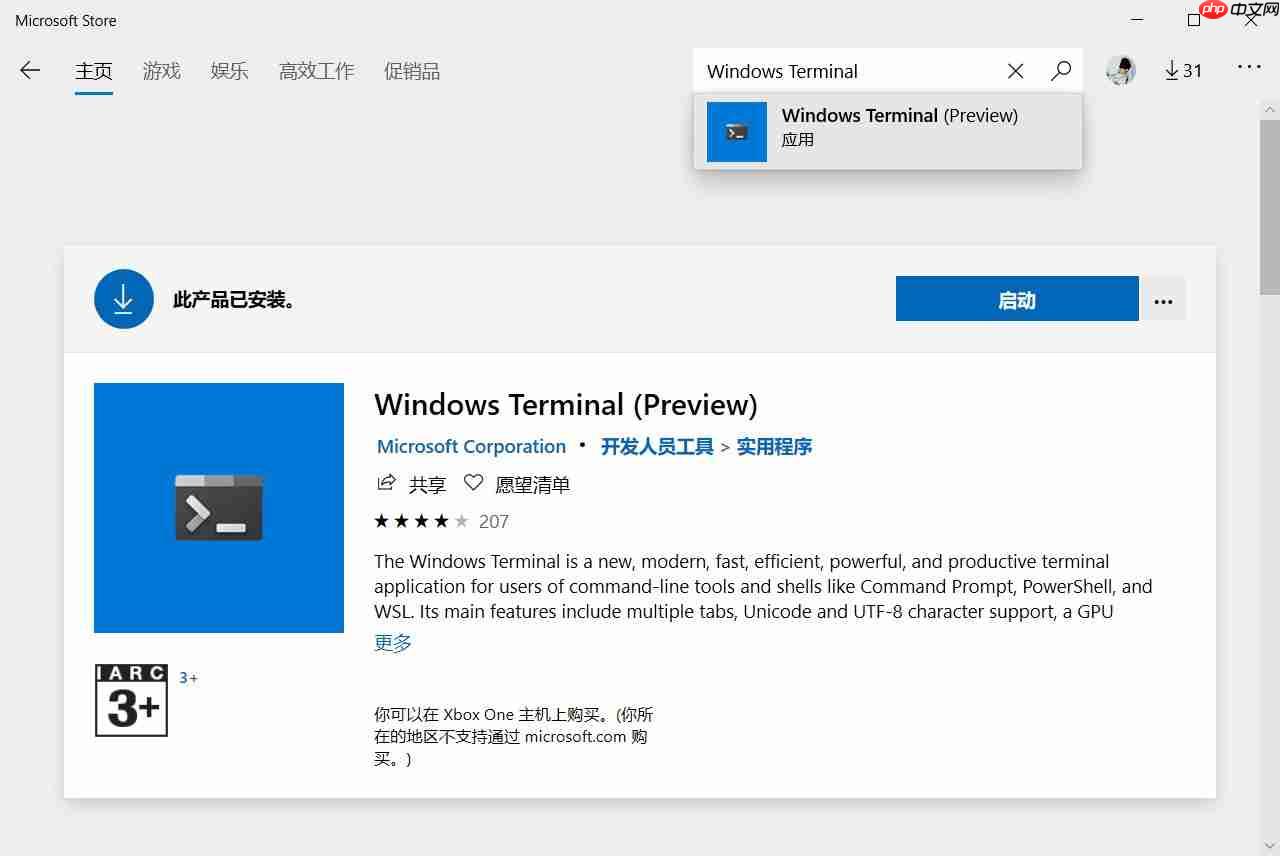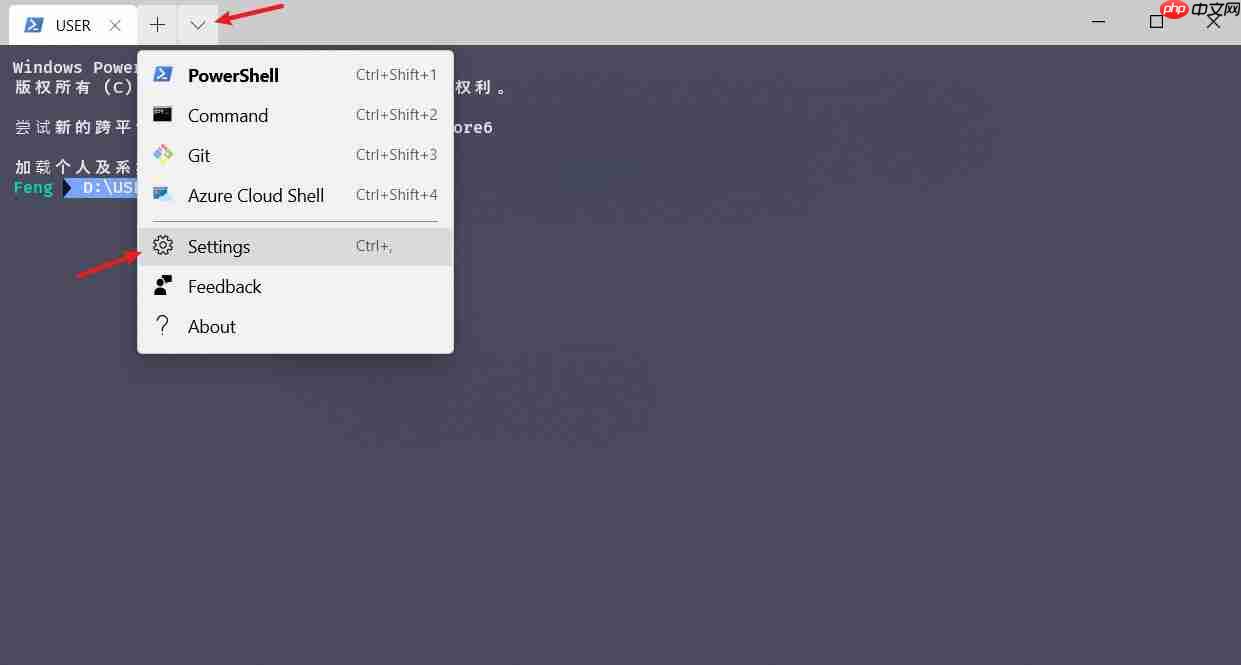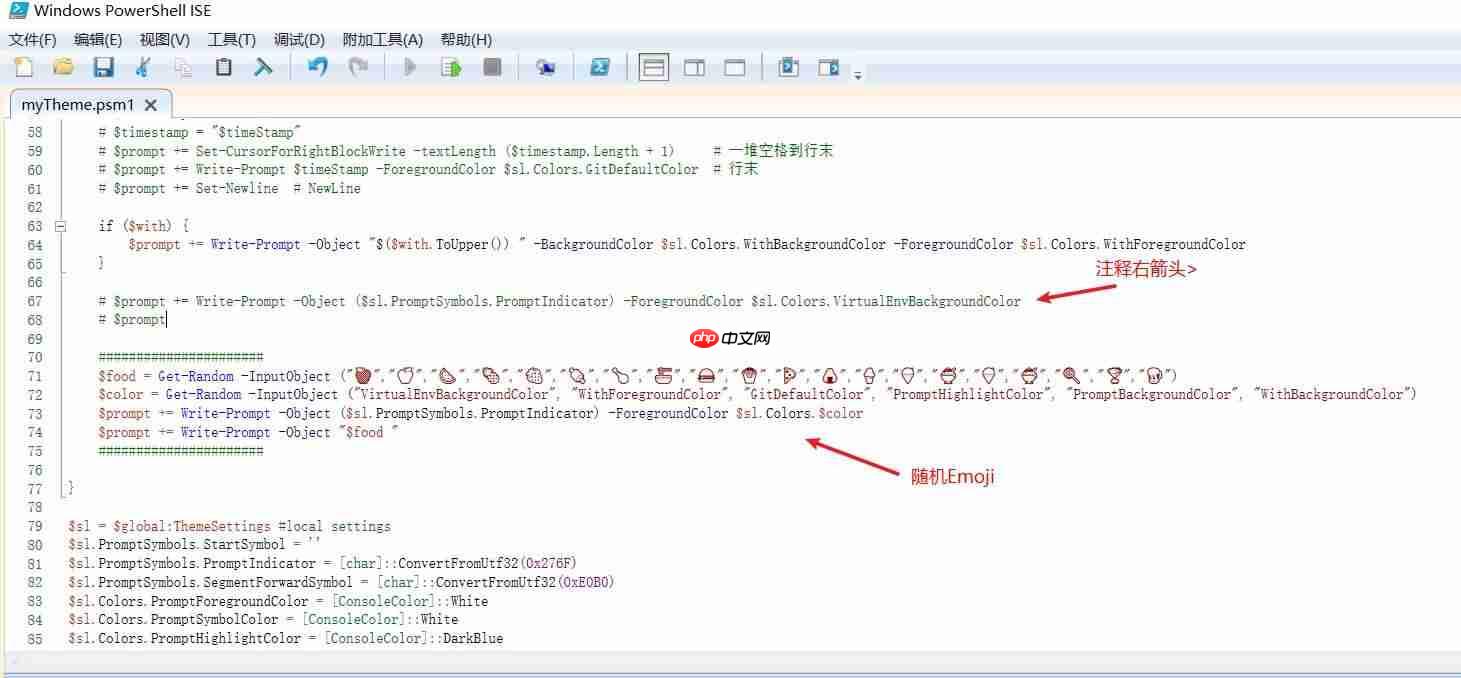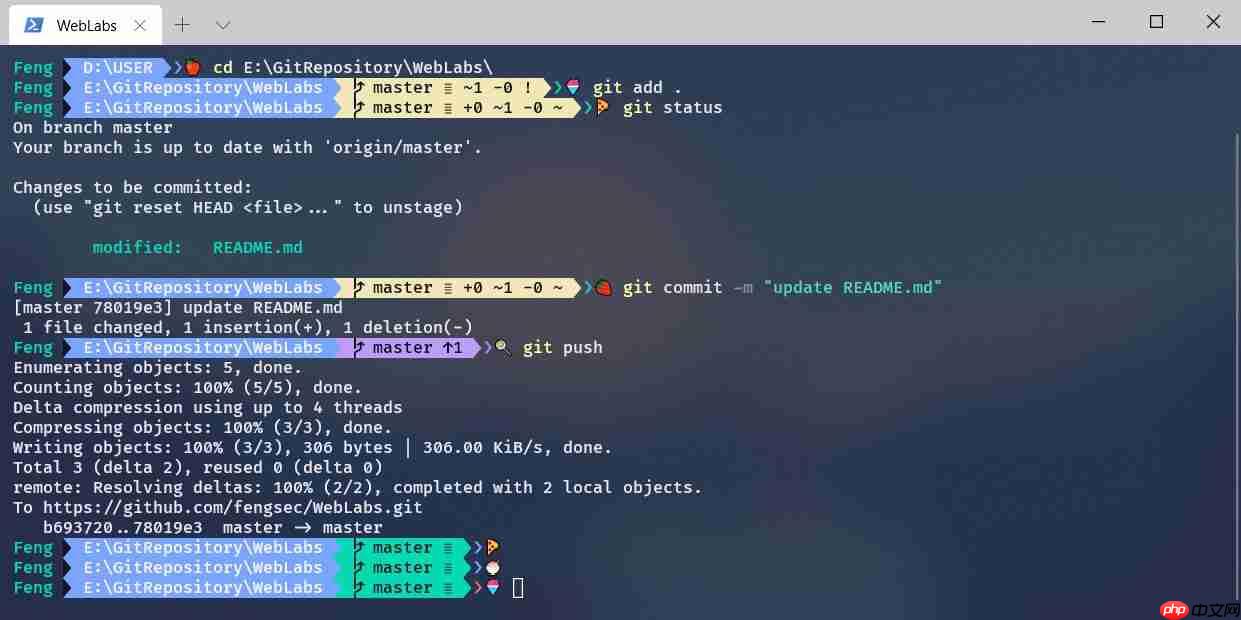windows terminal是微软推出的新一代终端,具有超高的可扩展性,用户可以自由定制终端的外观,比旧版cmd的黑色窗口更加美观且功能强大。
安装只需在Windows自带的应用商店中搜索Windows Terminal,点击安装即可。您也可以通过下载Microsoft/Terminal的源码进行自定义安装。

基本配置首先启动Windows Terminal终端,点击右下角的三角形图标,选择Settings以打开配置文件profiles.json。

以下是配置PowerShell和Cmd的示例,如需配置其他终端如GitBash,请参考下面的代码进行自定义设置。
"profiles":[
{
// PowerShell
"guid": "{61c54bbd-c2c6-5271-96e7-009a87ff44bf}", // 唯一ID
"name": "PowerShell",
"commandline": "powershell.exe", // 命令行所在位置
"colorScheme" : "Campbell", // 主题
"useAcrylic": true, // 毛玻璃
"acrylicOpacity" : 0.8, // 不透明度
"fontSize": 10, // 字体大小
"fontFace" : "Consolas", // 字体
"cursorShape" : "emptyBox", // 光标形状,bar/emptyBox/filledBox/underscore/vintage
"padding": "10, 10, 10, 10", // 边距
"closeOnExit": true, // 关闭时退出终端
"startingDirectory": "./", // 当前目录打开
"historySize": 9001, // 上滚历史行数
"hidden": false
},
{
// Command
"guid": "{0caa0dad-35be-5f56-a8ff-afceeeaa6101}",
"name": "Command",
"commandline": "cmd.exe", // 命令行所在位置
"colorScheme" : "Campbell", // 主题
"useAcrylic": true, // 毛玻璃
"acrylicOpacity" : 0.8, // 不透明度
"fontSize": 10, // 字体大小
"fontFace" : "Consolas", // 字体
"cursorShape" : "emptyBox", // 光标形状,bar/emptyBox/filledBox/underscore/vintage
"padding": "10, 10, 10, 10", // 边距
"closeOnExit": true, // 关闭时退出终端
"startingDirectory": "./", // 当前目录打开
"hidden": false,
"historySize": 9001
}
],美化方面,推荐使用Fira Code字体。访问Github仓库,点击releases下载FiraCode_2.zip,解压后进入tff文件夹,双击安装字体。安装后,在配置文件profiles.json中修改字体设置并保存。
"profiles":[
{
// PowerShell
...
"fontFace" : "Fira Code", // 字体
...
}
]为了修改配色,访问终端配色开源库iTerm2-Color-Schemes,选择喜欢的配色方案。例如,这里选择rebecca,在配色库中找到rebecca.json,复制配色方案。
{
"name": "rebecca",
"black": "#12131e",
"red": "#dd7755",
"green": "#04dbb5",
"yellow": "#f2e7b7",
"blue": "#7aa5ff",
"purple": "#bf9cf9",
"cyan": "#56d3c2",
"white": "#e4e3e9",
"brightBlack": "#666699",
"brightRed": "#ff92cd",
"brightGreen": "#01eac0",
"brightYellow": "#fffca8",
"brightBlue": "#69c0fa",
"brightPurple": "#c17ff8",
"brightCyan": "#8bfde1",
"brightWhite": "#f4f2f9",
"background": "#292a44",
"foreground": "#e8e6ed"
}在配置文件profiles.json中找到schemes列表,将复制的配色方案粘贴进去。
"schemes": [
{
"name": "rebecca",
"black": "#12131e",
"red": "#dd7755",
"green": "#04dbb5",
"yellow": "#f2e7b7",
"blue": "#7aa5ff",
"purple": "#bf9cf9",
"cyan": "#56d3c2",
"white": "#e4e3e9",
"brightBlack": "#809699",
"brightRed": "#ff92cd",
"brightGreen": "#01eac0",
"brightYellow": "#fffca8",
"brightBlue": "#69c0fa",
"brightPurple": "#c17ff8",
"brightCyan": "#8bfde1",
"brightWhite": "#f4f2f9",
"background": "#292a44",
"foreground": "#e8e6ed"
}
]最后,在profiles列表中将相应终端的colorScheme属性设置为配色方案中的name值。
"profiles":[
{
// PowerShell
...
"colorScheme" : "rebecca", // 主题
...
}
]为了添加Emoji,由于Typecho编辑器不支持Emoji,这里提供了一个Emoji表情网站,供您自行选择使用。
使用管理员模式打开PowerShell,输入以下命令创建配置文件。
if (!(Test-Path -Path $PROFILE )) { New-Item -Type File -Path $PROFILE -Force }
# C:\Users\[用户名]\Documents\WindowsPowerShell\Microsoft.PowerShell_profile.ps1安装choco。
> iwr https://chocolatey.org/install.ps1 -UseBasicParsing | iex # 报错的话应该是Powershell的执行策略问题 > Get-ExecutionPolicy # 查看当前策略 > Set-ExecutionPolicy Unrestricted # 设置为Unrestricted # 等下全部配置完成后,再将执行策略设回前面查看策略时的值(更安全) > choco # 测试是否安装成功
使用choco安装ConEmu。

SmartB2B 是一款基于PHP、MySQL、Smarty的B2B行业电子商务网站管理系统,系统提供了供求模型、企业模型、产品模型、人才招聘模型、资讯模型等模块,适用于想在行业里取得领先地位的企业快速假设B2B网站,可以运行于Linux与Windows等多重服务器环境,安装方便,使用灵活。 系统使用当前流行的PHP语言开发,以MySQL为数据库,采用B/S架构,MVC模式开发。融入了模型化、模板
> choco install ConEmu
安装oh-my-posh和posh-git。
> Install-Module posh-git -Scope CurrentUser > Install-Module oh-my-posh -Scope CurrentUser > install-module posh-git
打开PowerShell配置文件,如果不知道文件路径可使用$PROFILE查看,打开后插入以下语句。
Import-Module posh-git
Import-Module oh-my-posh
Set-Theme Paradox # 设置主题,具体可选主题可看后面
function prompt {"PS $pwd X >" } # X代表Emoji表情最后在PowerShell内输入配置文件路径来更新配置并重启PowerShell。
随机Emoji可以通过打开oh-my-posh主题配置文件目录来实现。
# 主题配置文件目录 C:\Users\[用户名]\Documents\WindowsPowerShell\Modules\oh-my-posh\2.0.332\Themes\
选择想修改的主题文件,复制一份重命名为myTheme.psm1,打开myTheme.psm1进行修改。找到以下表示右箭头>的语句,并在其前面加入#进行注释。
# $prompt += Write-Prompt -Object ($sl.PromptSymbols.PromptIndicator) -ForegroundColor $sl.Colors.VirtualEnvBackgroundColor
然后插入以下代码。
$food = Get-Random -InputObject ("X","X","X"....) # X代表Emoji标签
$color = Get-Random -InputObject ("VirtualEnvBackgroundColor", "WithForegroundColor", "GitDefaultColor", "PromptHighlightColor", "PromptBackgroundColor", "WithBackgroundColor")
$prompt += Write-Prompt -Object ($sl.PromptSymbols.PromptIndicator) -ForegroundColor $sl.Colors.$color
$prompt += Write-Prompt -Object "$food "
最后打开PowerShell配置文件,应用myTheme主题。
Set-Theme myTheme # 设置主题
最终效果如下:

其它myTheme主题配置如下:
#requires -Version 2 -Modules posh-git
function Write-Theme {
param(
[bool]
$lastCommandFailed,
[string]
$with
)
$lastColor = $sl.Colors.PromptBackgroundColor
$prompt = Write-Prompt -Object $sl.PromptSymbols.StartSymbol -ForegroundColor $sl.Colors.PromptForegroundColor -BackgroundColor $sl.Colors.SessionInfoBackgroundColor
#check the last command state and indicate if failed
If ($lastCommandFailed) {
$prompt += Write-Prompt -Object "$($sl.PromptSymbols.FailedCommandSymbol) " -ForegroundColor $sl.Colors.CommandFailedIconForegroundColor -BackgroundColor $sl.Colors.SessionInfoBackgroundColor
}
#check for elevated prompt
If (Test-Administrator) {
$prompt += Write-Prompt -Object "$($sl.PromptSymbols.ElevatedSymbol) " -ForegroundColor $sl.Colors.AdminIconForegroundColor -BackgroundColor $sl.Colors.SessionInfoBackgroundColor
}
$user = $sl.CurrentUser
$computer = [System.Environment]::MachineName
$path = Get-FullPath -dir $pwd
if (Test-NotDefaultUser($user)) {
# User@Hostname
$prompt += Write-Prompt -Object "$user " -ForegroundColor $sl.Colors.GitDefaultColor -BackgroundColor $sl.Colors.SessionInfoBackgroundColor
# $prompt += Write-Prompt -Object "$user@$computer " -ForegroundColor $sl.Colors.SessionInfoForegroundColor -BackgroundColor $sl.Colors.SessionInfoBackgroundColor
}
if (Test-VirtualEnv) {
$prompt += Write-Prompt -Object "$($sl.PromptSymbols.SegmentForwardSymbol) " -ForegroundColor $sl.Colors.SessionInfoBackgroundColor -BackgroundColor $sl.Colors.VirtualEnvBackgroundColor
$prompt += Write-Prompt -Object "$($sl.PromptSymbols.VirtualEnvSymbol) $(Get-VirtualEnvName) " -ForegroundColor $sl.Colors.VirtualEnvForegroundColor -BackgroundColor $sl.Colors.VirtualEnvBackgroundColor
$prompt += Write-Prompt -Object "$($sl.PromptSymbols.SegmentForwardSymbol) " -ForegroundColor $sl.Colors.VirtualEnvBackgroundColor -BackgroundColor $sl.Colors.PromptBackgroundColor
}
else {
$prompt += Write-Prompt -Object "$($sl.PromptSymbols.SegmentForwardSymbol) " -ForegroundColor $sl.Colors.SessionInfoBackgroundColor -BackgroundColor $sl.Colors.PromptBackgroundColor
}
# Writes the drive portion
$prompt += Write-Prompt -Object "$path " -ForegroundColor $sl.Colors.PromptForegroundColor -BackgroundColor $sl.Colors.PromptBackgroundColor
$status = Get-VCSStatus
if ($status) {
$themeInfo = Get-VcsInfo -status ($status)
$lastColor = $themeInfo.BackgroundColor
$prompt += Write-Prompt -Object $($sl.PromptSymbols.SegmentForwardSymbol) -ForegroundColor $sl.Colors.PromptBackgroundColor -BackgroundColor $lastColor
$prompt += Write-Prompt -Object " $($themeInfo.VcInfo) " -BackgroundColor $lastColor -ForegroundColor $sl.Colors.GitForegroundColor
}
# Writes the postfix to the prompt
$prompt += Write-Prompt -Object $sl.PromptSymbols.SegmentForwardSymbol -ForegroundColor $lastColor
# Time
# $timeStamp = Get-Date -UFormat %R
# $timestamp = "$timeStamp"
# $prompt += Set-CursorForRightBlockWrite -textLength ($timestamp.Length + 1)
# 一堆空格到行末
# $prompt += Write-Prompt $timeStamp -ForegroundColor $sl.Colors.GitDefaultColor # 行末
# $prompt += Set-Newline # NewLine
if ($with) {
$prompt += Write-Prompt -Object "$($with.ToUpper()) " -BackgroundColor $sl.Colors.WithBackgroundColor -ForegroundColor $sl.Colors.WithForegroundColor
}
# $prompt += Write-Prompt -Object ($sl.PromptSymbols.PromptIndicator) -ForegroundColor $sl.Colors.VirtualEnvBackgroundColor
# $prompt
######################
$food = Get-Random -InputObject (“X”,“X”,“X”,“X”,“X”,)
$color = Get-Random -InputObject ("VirtualEnvBackgroundColor", "WithForegroundColor", "GitDefaultColor", "PromptHighlightColor", "PromptBackgroundColor", "WithBackgroundColor")
$prompt += Write-Prompt -Object ($sl.PromptSymbols.PromptIndicator) -ForegroundColor $sl.Colors.$color
$prompt += Write-Prompt -Object "$food "
######################
}
$sl = $global:ThemeSettings #local settings
$sl.PromptSymbols.StartSymbol = ''
$sl.PromptSymbols.PromptIndicator = [char]::ConvertFromUtf32(0x276F)
$sl.PromptSymbols.SegmentForwardSymbol = [char]::ConvertFromUtf32(0xE0B0)
$sl.Colors.PromptForegroundColor = [ConsoleColor]::White
$sl.Colors.PromptSymbolColor = [ConsoleColor]::White
$sl.Colors.PromptHighlightColor = [ConsoleColor]::DarkBlue
$sl.Colors.GitForegroundColor = [ConsoleColor]::Black
$sl.Colors.WithForegroundColor = [ConsoleColor]::DarkRed
$sl.Colors.WithBackgroundColor = [ConsoleColor]::Magenta
$sl.Colors.VirtualEnvBackgroundColor = [System.ConsoleColor]::Red
$sl.Colors.VirtualEnvForegroundColor = [System.ConsoleColor]::White 




























